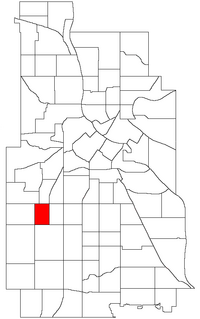East Bde Maka Ska, Minneapolis facts for kids
Quick facts for kids
East Bde Maka Ska
|
|
|---|---|
|
Neighborhood
|
|

Location of East Bde Maka Ska within the U.S. city of Minneapolis
|
|
| Country | United States |
| State | Minnesota |
| County | Hennepin |
| City | Minneapolis |
| Community | Calhoun-Isles |
| City Council Ward | 10 |
| Area | |
| • Total | 0.425 sq mi (1.10 km2) |
| Population
(2008-2012)
|
|
| • Total | 2,502 |
| • Density | 5,887/sq mi (2,273.0/km2) |
| Time zone | UTC-6 (CST) |
| • Summer (DST) | UTC-5 (CDT) |
| ZIP code |
55408
|
| Area code(s) | 612 |
| Historical population | |||
|---|---|---|---|
| Census | Pop. | %± | |
| 1980 | 2,649 | — | |
| 1990 | 2,495 | −5.8% | |
| 2000 | 2,545 | 2.0% | |
| 2010 | 2,457 | −3.5% | |
East Bde Maka Ska is a neighborhood in the Calhoun-Isles community of Minneapolis, Minnesota. It used to be called East Calhoun until August 2021. This neighborhood is located south of the East Isles area. Its northern part, along with sections of East Isles, Lowry Hill East, and South Uptown, forms the city's lively Uptown district. East Bde Maka Ska is bordered by Lake Street to the north, Hennepin Avenue to the east, West 36th Street to the south, and Bde Maka Ska (a lake) to the west.
Contents
History of East Bde Maka Ska
Why the Neighborhood Name Changed
The neighborhood was originally named East Calhoun. This name came from the nearby Lake Calhoun. In August 2021, the name was officially changed to East Bde Maka Ska.
This change happened because people wanted to honor the history of the Dakota people. The Dakota are the original inhabitants of this land. The new name helps recognize their connection to the area. The Minneapolis City Council approved the name change on July 23, 2021. It became official just a few days later, on July 31, 2021.
The local neighborhood group is known as ECCO. This stands for the East Calhoun Community Organization.
Helping the Environment in the Neighborhood
The East Bde Maka Ska neighborhood is known for its efforts to protect the environment. It has been a leader in conservation.
Recycling Organic Waste
This neighborhood was one of the first in Minneapolis to start organic waste recycling. This is a way to recycle food scraps and yard waste. It helps reduce the amount of trash that goes into landfills. In 2015, the city of Minneapolis started a special program here. They picked up organic waste right from people's curbs. This program was very successful.
Community Programs for a Greener Future
The neighborhood has also created special programs to help the environment.
- Waste Watchers is a program that teaches people about recycling and organic waste. It helps neighbors work together to reduce waste.
- The Turn Off Lights Behind You (TOLBY) program helps families save energy. It reminds kids and adults to turn off lights in rooms when no one is using them. This helps reduce how much electricity is used.

